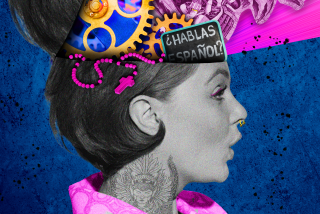Secrets revealed in the death of Salvadoran poet Roque Dalton
The death of Salvadoran poet Roque Dalton in 1975 is one of the great tragedies of Latin American literature and of the Latin American left. And it was a tragedy the left inflicted on itself.
Dalton had joined one of the armed rebel groups fighting against El Salvador’s dictatorship. He had, by then, already established an international reputation as a writer. Most of his best writing came during his exile in Cuba, where he wrote seven books of poetry, and “Miguel Marmol,” a biography of a 1930s Salvadoran revolutionary that’s one of the great, underappreciated masterpieces of Latin American historical writing.
Dalton was executed by his own rebel movement on Mother’s Day in 1975 — he was accused of being a spy for both the CIA and Cuba. This month, Dalton was officially incorporated into the pantheon of El Salvador’s national cultural heroes: El Salvador’s new, center-left government declared May 14 as National Poetry Day in Dalton’s honor.
At the same time, new details have emerged about Dalton’s killing, and a more complete portrait of the poet’s final hours can finally be told.
It’s long been known that Joaquin Villalobos and other leaders of the People’s Revolutionary Army (ERP in Spanish) ordered his execution. Ben Ehrenreich filled out much of the picture of Dalton’s final days in an excellent 2010 piece for the London Review of Books. Dalton was killed, Ehrenreich wrote, after a series of personal conflicts in the rebel leadership and an ideological split over revolutionary strategy.
But it’s never been clear exactly who pulled the trigger — and Dalton’s body has never been found. Now a witness to the killing has spoken publicly for the first time, to the Austrian filmmaker Tina Leisch, who has produced an 86-minute documentary about Dalton’s life, “Fusilemos La Noche,” “Let’s Shoot the Night.”
According to the Salvadoran magazine Contrapunto, Leisch’s film includes an interview with a man who was present at the execution, then-ERP-militant Porfirio Hernandez. On May 10, 1975, Dalton was being held prisoner by the urban guerrilla group at a San Salvador safe house. On that day, Hernandez said, he left the safe house briefly (to visit his mother) and returned to learn the ERP had already executed a man who was being held with Dalton, Armando Arteaga. Hernandez then saw Villalobos aim a gun at Dalton.
“He fired a shot, and he missed, and Dalton threw himself on a bed,” Hernandez said. Dalton yelled back, “Don’t kill,” (No matés, in Central American Spanish), but Villalobos fired a second shot and killed the poet.
Villalobos would go on to become one of El Salvador’s most respected guerrilla leaders, helping to transform the ERP into a powerful military force that, in effect, fought El Salvador’s U.S.-backed military to a draw. After the Salvadoran Civil War ended with a peace accord in 1992, Villalobos moved to London and his politics moved decidedly to the right.
Dalton would become one of the Salvadoran revolution’s leading martyrs, his legacy as a poet and spokesman for the poor embraced by all factions of the Salvadoran left — including the faction that had him killed.
ALSO:
‘Nothin’ but Blues Skies’ tells Rust Belt stories
Tech-savvy parents prefer print over e-books for kids, PEW reports
George Packer chronicles American boom and bust in ‘The Unwinding’
More to Read
Sign up for our Book Club newsletter
Get the latest news, events and more from the Los Angeles Times Book Club, and help us get L.A. reading and talking.
You may occasionally receive promotional content from the Los Angeles Times.







